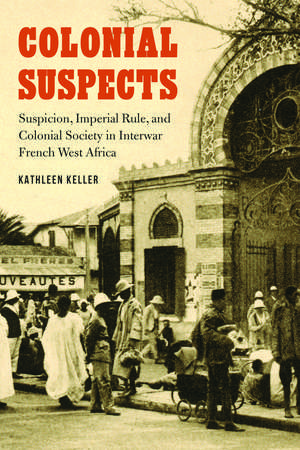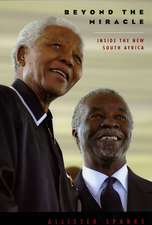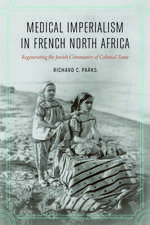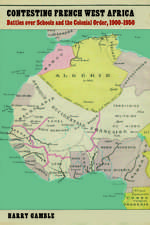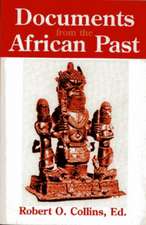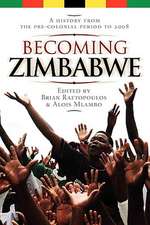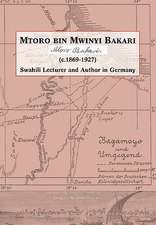Colonial Suspects: Suspicion, Imperial Rule, and Colonial Society in Interwar French West Africa: France Overseas: Studies in Empire and Decolonization
Autor Kathleen Kelleren Limba Engleză Hardback – 31 mar 2018
A Vietnamese cook, a German journalist, and a Senegalese student—what did they have in common? They were all suspicious persons kept under surveillance by French colonial authorities in West Africa in the 1920s and 1930s. Colonial Suspects looks at the web of surveillance set up by the French government during the twentieth century as France’s empire slipped into crisis.
As French West Africa and the French Empire more generally underwent fundamental transformations during the interwar years, French colonial authorities pivoted from a stated policy of “assimilation” to that of “association.” Surveillance of both colonial subjects and visitors traveling through the colonies increased in scope. The effect of this change in policy was profound: a “culture of suspicion” became deeply ingrained in French West African society.
Kathleen Keller notes that the surveillance techniques developed over time by the French included “shadowing, postal control, port police, informants, denunciations, home searches, and gossip.” This ad hoc approach to colonial surveillance mostly proved ineffectual, however, and French colonies became transitory spaces where a global cast of characters intermixed and French power remained precarious. Increasingly, French officials—in the colonies and at home—reacted in short-sighted ways as both perceived and real backlash occurred with respect to communism, pan-Africanism, anticolonialism, black radicalism, and pan-Islamism. Focusing primarily on the port city of Dakar (Senegal), Keller unravels the threads of intrigue, rumor, and misdirection that informed this chaotic period of French colonial history.
As French West Africa and the French Empire more generally underwent fundamental transformations during the interwar years, French colonial authorities pivoted from a stated policy of “assimilation” to that of “association.” Surveillance of both colonial subjects and visitors traveling through the colonies increased in scope. The effect of this change in policy was profound: a “culture of suspicion” became deeply ingrained in French West African society.
Kathleen Keller notes that the surveillance techniques developed over time by the French included “shadowing, postal control, port police, informants, denunciations, home searches, and gossip.” This ad hoc approach to colonial surveillance mostly proved ineffectual, however, and French colonies became transitory spaces where a global cast of characters intermixed and French power remained precarious. Increasingly, French officials—in the colonies and at home—reacted in short-sighted ways as both perceived and real backlash occurred with respect to communism, pan-Africanism, anticolonialism, black radicalism, and pan-Islamism. Focusing primarily on the port city of Dakar (Senegal), Keller unravels the threads of intrigue, rumor, and misdirection that informed this chaotic period of French colonial history.
Din seria France Overseas: Studies in Empire and Decolonization
- 15%
 Preț: 474.59 lei
Preț: 474.59 lei -
 Preț: 202.11 lei
Preț: 202.11 lei -
 Preț: 398.42 lei
Preț: 398.42 lei -
 Preț: 124.10 lei
Preț: 124.10 lei -
 Preț: 139.26 lei
Preț: 139.26 lei -
 Preț: 107.40 lei
Preț: 107.40 lei -
 Preț: 281.80 lei
Preț: 281.80 lei -
 Preț: 201.13 lei
Preț: 201.13 lei -
 Preț: 319.49 lei
Preț: 319.49 lei -
 Preț: 127.85 lei
Preț: 127.85 lei -
 Preț: 77.73 lei
Preț: 77.73 lei -
 Preț: 222.69 lei
Preț: 222.69 lei -
 Preț: 220.57 lei
Preț: 220.57 lei -
 Preț: 222.53 lei
Preț: 222.53 lei -
 Preț: 520.47 lei
Preț: 520.47 lei -
 Preț: 252.64 lei
Preț: 252.64 lei -
 Preț: 459.22 lei
Preț: 459.22 lei -
 Preț: 515.08 lei
Preț: 515.08 lei -
 Preț: 328.52 lei
Preț: 328.52 lei -
 Preț: 218.28 lei
Preț: 218.28 lei - 23%
 Preț: 585.81 lei
Preț: 585.81 lei -
 Preț: 297.82 lei
Preț: 297.82 lei -
 Preț: 330.27 lei
Preț: 330.27 lei -
 Preț: 432.95 lei
Preț: 432.95 lei -
 Preț: 182.45 lei
Preț: 182.45 lei -
 Preț: 431.04 lei
Preț: 431.04 lei -
 Preț: 249.75 lei
Preț: 249.75 lei -
 Preț: 181.09 lei
Preț: 181.09 lei -
 Preț: 137.73 lei
Preț: 137.73 lei -
 Preț: 223.93 lei
Preț: 223.93 lei -
 Preț: 253.40 lei
Preț: 253.40 lei -
 Preț: 390.53 lei
Preț: 390.53 lei -
 Preț: 398.59 lei
Preț: 398.59 lei -
 Preț: 215.99 lei
Preț: 215.99 lei - 23%
 Preț: 482.30 lei
Preț: 482.30 lei -
 Preț: 470.76 lei
Preț: 470.76 lei -
 Preț: 515.46 lei
Preț: 515.46 lei -
 Preț: 153.66 lei
Preț: 153.66 lei -
 Preț: 427.77 lei
Preț: 427.77 lei -
 Preț: 396.68 lei
Preț: 396.68 lei
Preț: 393.58 lei
Nou
Puncte Express: 590
Preț estimativ în valută:
75.32€ • 78.35$ • 62.18£
75.32€ • 78.35$ • 62.18£
Carte tipărită la comandă
Livrare economică 14-28 aprilie
Preluare comenzi: 021 569.72.76
Specificații
ISBN-13: 9780803296916
ISBN-10: 0803296916
Pagini: 264
Ilustrații: 1 map, index
Dimensiuni: 152 x 229 x 26 mm
Greutate: 0.54 kg
Editura: Nebraska
Colecția University of Nebraska Press
Seria France Overseas: Studies in Empire and Decolonization
Locul publicării:United States
ISBN-10: 0803296916
Pagini: 264
Ilustrații: 1 map, index
Dimensiuni: 152 x 229 x 26 mm
Greutate: 0.54 kg
Editura: Nebraska
Colecția University of Nebraska Press
Seria France Overseas: Studies in Empire and Decolonization
Locul publicării:United States
Notă biografică
Kathleen Keller is an associate professor of history at Gustavus Adolphus College.
Cuprins
Acknowledgments
List of Abbreviations
A Note on Translations
Introduction
1. “A Vigilant Surveillance”: Creating Suspicion in Interwar French West Africa
2. “Proceed with a Discreet Surveillance”: The Investigation and Surveillance of Suspects
3. Enemies, Charlatans, and Propagandists: Foreigners under Surveillance in AOF
4. “Powerless with Regard to Our Nationals”: Policing Frenchness and Redefining the Civilizing Mission in AOF
5. Creating Networks: African Suspects, Radical Politics, and Colonial Repression
Conclusion
Notes
Bibliography
Index
List of Abbreviations
A Note on Translations
Introduction
1. “A Vigilant Surveillance”: Creating Suspicion in Interwar French West Africa
2. “Proceed with a Discreet Surveillance”: The Investigation and Surveillance of Suspects
3. Enemies, Charlatans, and Propagandists: Foreigners under Surveillance in AOF
4. “Powerless with Regard to Our Nationals”: Policing Frenchness and Redefining the Civilizing Mission in AOF
5. Creating Networks: African Suspects, Radical Politics, and Colonial Repression
Conclusion
Notes
Bibliography
Index
Recenzii
"[Colonial Suspects is] an important work and an in-depth study of colonial policing."—Fabienne Chamelot, African Studies Review
"Keller's well-written book examines the history of colonial surveillance in interwar French West Africa (Afrique Occidentale Française, or AOF), with an emphasis on Senegal and Dakar, the capital of AOF. Based on a large number of archival sources from Senegal and France, her study is situated primarily within the historical literature about French imperialism, occasionally taking into account works in political, social, and literary theory. . . . Keller's study is an important and insightful addition to a growing field of works that bring together the history of colonialism and that of global surveillance."—Daniel Brückenhaus, Journal of Interdisciplinary History
"Kathleen Keller offers a tightly framed account of the efforts of the French imperial state to maintain surveillance of individuals deemed suspicious in French West Africa between the world wars."—Gregory Mann, American Historical Review
"Colonial Suspects makes an important contribution to our understanding of how colonial states operated and of how anticolonialism emerged at the interstices of empire. But it is also the beguiling set of characters, the colorful primary sources, and the vivid style with which Keller brings them all to life that make this book worth reading—not only for specialists of West Africa, but for students of colonial history and of police history more broadly."—Michael Goebel, Journal of Modern History
"Keller provides some fascinating insights into how police information was categorized and organized and how networks of administrators shared information on suspicious travelers from different parts of the empire. . . . That Colonial Suspects has raised many new questions is testament to its importance."—Richard Roberts, International Journal of African Historical Studies
“Colonial Suspects explores the obsessive French colonial preoccupation with constructing otherness, monitoring outsiders, and persecuting those at the poorest margins of white society. From high-profile criminal cases to intimate lives, the book offers a fine-grained perspective on the culture of suspicion pervading the policing of subversion—real and imagined—within France’s West African colonies after World War I.”—Martin Thomas, professor of history at the University of Exeter and author of Empires of Intelligence: Security Services and Colonial Disorder after 1914
“Colonial Suspects breaks new ground and has compelling tie-ins to current debates over surveillance that will resonate with students and academics in the field. One of the most exciting things about it is how it shows that interwar French West Africa was in some ways a global crossroads.”—Elizabeth A. Foster, associate professor of history at Tufts University and the author of Faith in Empire: Religion, Politics, and Colonial Rule in French Senegal, 1880–1940
